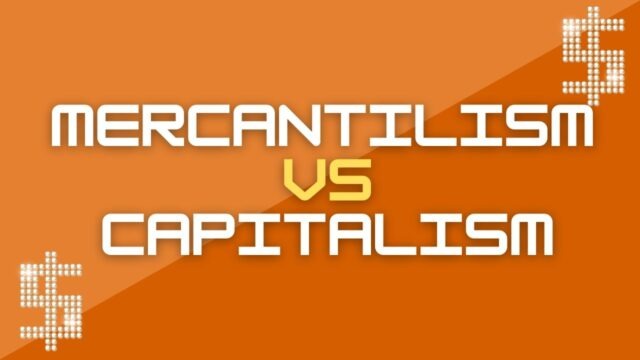
There is a lot of debate surrounding the two economic systems of mercantilism and capitalism. While both have their benefits, it can be difficult to determine which is better. In this blog post, we will explore the two systems in depth and compare them to each other. We will look at the benefits and drawbacks of each system and determine which one is ultimately better.
Additional Reading:
Mercantilism
Mercantilism is an economic theory that holds that the wealth of a nation is increased through the acquisition of Gold and Silver. Mercantilism was the dominant economic theory in Europe from the 16th to the 18th centuries. Mercantilist nations sought to increase their wealth by establishing colonies around the world and by engaging in Trade. Mercantilism vs Capitalism Mercantilism is often contrasted with Capitalism. Capitalism is an economic system in which private individuals or companies own the means of production and engage in Trade for profit. Unlike Mercantilism, Capitalism does not seek to increase the amount of Gold and Silver held by a nation. Instead, it focuses on the production of Goods and Services.
Capitalism
Capitalism is an economic system in which private individuals or businesses own the means of production and operate for profit. The main characteristic of capitalism is the pursuit of profit, which drives investment, production, and distribution. Throughout history, there have been a variety of different economic systems, but capitalism is the dominant system in the world today. While some critics argue that capitalism is exploitative and creates unequal societies, supporters argue that it encourages innovation and self-interest, which leads to economic growth. Proponents also point to the fact that capitalism has lifted billions of people out of poverty. Whether you support or oppose capitalism, there is no denying that it has had a profound impact on the world economy.
The benefits of capitalism
Capitalism is an economic system in which private individuals or businesses own the means of production and operate for profit. This system is based on the principle of free market competition, in which businesses compete for customers by offering goods and services at the best possible price. In a capitalist economy, businesses are free to set their own prices, hire and fire employees, and produce whatever they deem profitable.
The main goal of capitalism is to generate economic growth and wealth, which can create opportunities for businesses to invest in new products and services. capitalism has been shown to be an effective way of creating innovation and wealth. It has also been criticized for benefiting the wealthy at the expense of the poor, causing environmental destruction, and creating a culture of greed. Overall, capitalism is a complex economic system with both positive and negative effects.
The benefits of mercantilism
While this may seem like a simple enough idea, mercantilism has far-reaching effects on the economies of both exporting and importing nations. By creating a system of tariffs and other regulations, mercantilist nations are able to discourage imports and encourage exports. This, in turn, leads to an inflow of gold and silver, which can be used to fund public works projects or to pay for wars. Moreover, mercantilist policies often lead to increased production and employment, as businesses seek to take advantage of the favourable trade conditions. In sum, mercantilism is a powerful tool for increasing the wealth and influence of a nation.
The drawbacks of mercantilism and capitalism
They have number of drawbacks. Mercantilism can lead to exploitative relationships between colonizers and the colonized, as well as a created a zero-sum mentality where one nation’s gain is another nation’s loss. Capitalism, on the other hand, can lead to concentration of wealth and power in the hands of a few people, as well as widespread poverty and inequality. As a result, it is important to be aware of the drawbacks of both mercantilism and capitalism before implementing either system.
Comparison between the two systems
mercantilism and capitalism are two different systems that were prevalent during different periods of time. Mercantilism was the dominant economic system in Europe between the 16th and 18th centuries, while capitalism became the dominant economic system in the 19th century. Both mercantilism and capitalism are based on the idea of private ownership of businesses and property, but there are several key differences between the two systems.
Mercantilism is based on the idea that a country’s wealth is measured by its stockpile of gold and silver, while capitalism is based on the idea of economic growth and a free market. Mercantilism also relies on government regulation of trade, while capitalism promotes free trade. Finally, mercantilism encourages businesses to produce goods for export, while capitalism encourages businesses to produce goods for the domestic market. These differences between mercantilism and capitalism helped to shape the development of Europe during their respective periods of dominance.
How did capitalism evolve from mercantilism?
Capitalism evolved from mercantilism as a result of the Industrial Revolution. This period saw a shift from an agricultural to an industrial economy, and the rise of new classes of capitalists and workers. The increased competition among capitalists led to lower prices and higher wages for workers, as well as new technologies and production methods.

































